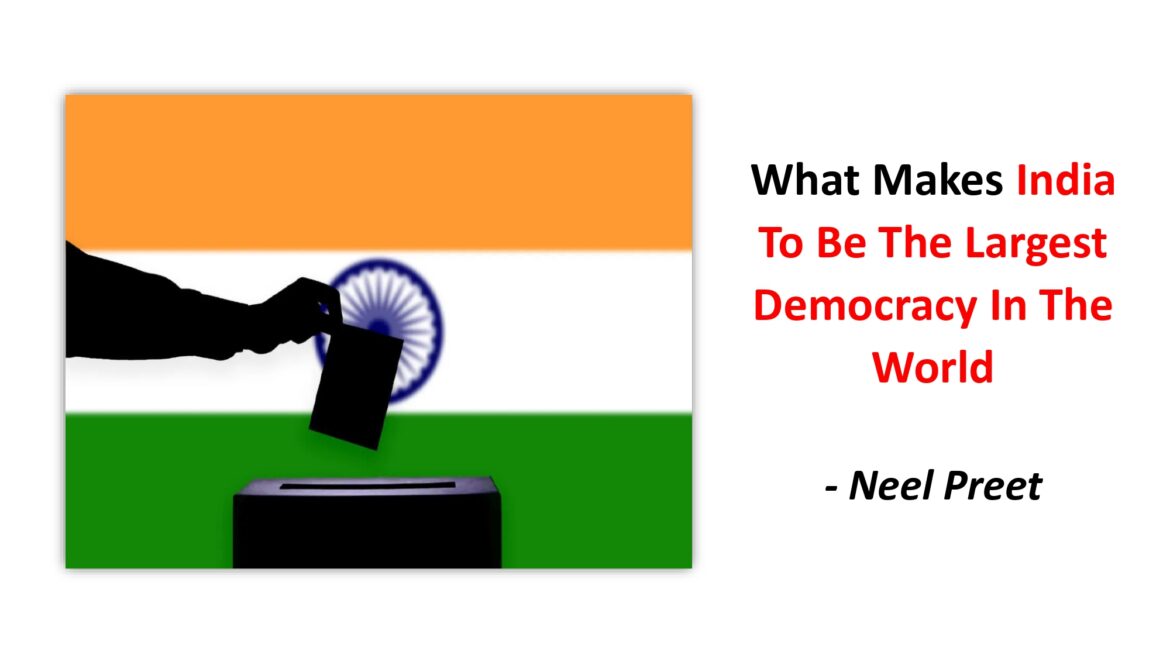Introduction: India, with its vast population and diverse cultural fabric, proudly holds the distinction of being the largest democracy in the world. The Indian democracy stands as a shining example of a nation that embraces pluralism, upholds democratic values, and provides its citizens with the right to choose their representatives. In this essay, we will explore the factors that contribute to India’s status as the largest democracy and discuss the principles and institutions that sustain this democratic framework.
Universal Adult Suffrage: One of the key factors that make India the largest democracy is its commitment to universal adult suffrage. Every Indian citizen, regardless of their gender, caste, religion, or socioeconomic background has the right to vote. This inclusive and egalitarian approach ensures that every voice is heard and that political power is distributed among the people!
Constitutional Framework: India’s democratic system is firmly rooted in its Constitution, which provides a robust framework for governance and protects the fundamental rights and freedoms of its citizens. The Constitution of India enshrines the principles of democracy, secularism, and social justice, providing a legal foundation for democratic governance.
Multi-Party System: India’s vibrant multi-party system is another key aspect of its democracy. The presence of numerous political parties representing a wide range of ideologies ensures a healthy competition of ideas and provides citizens with diverse choices during elections. This multi-party system reflects the pluralistic nature of Indian society and encourages democratic participation!
Independent Election Commission: India’s democratic process is overseen by an independent and impartial Election Commission. The Election Commission of India is responsible for conducting free and fair elections at regular intervals, ensuring the integrity of the electoral process. Its role in organizing and supervising elections has contributed to the credibility and transparency of India’s democratic system.
Freedom of Speech and Expression: India’s democratic fabric is strengthened by its commitment to freedom of speech and expression. Citizens have the right to express their opinions, criticize the government, and engage in public discourse. This freedom allows for a vibrant exchange of ideas, fosters a culture of debate and discussion, and holds those in power accountable!
Independent Judiciary: India’s independent judiciary plays a crucial role in upholding the principles of democracy and safeguarding the rights and liberties of citizens. The judiciary acts as a check on the executive and legislative branches, ensuring that they adhere to the constitutional principles and act in the best interests of the people.
Grassroots Democracy: India’s democratic framework extends to the grassroots level through the institution of Panchayati Raj. This decentralized system of local self-governance empowers communities at the village level, allowing them to participate in decision-making processes and implement development initiatives. Panchayati Raj promotes democratic participation, fosters social inclusion, and strengthens the foundations of Indian democracy!
Peaceful Transition of Power: India’s commitment to a peaceful transition of power is another hallmark of its democracy. Since gaining independence in 1947, India has witnessed multiple changes in government through democratic elections. Despite the diversity and complexities of Indian society, power transitions have been carried out peacefully, demonstrating the maturity and stability of the democratic process.
Conclusion: India’s status as the largest democracy in the world is a testament to its commitment to democratic principles, inclusivity, and the empowerment of its citizens. The factors that contribute to India’s democratic framework, including universal adult suffrage, a strong constitutional framework, a multi-party system, independent institutions, and grassroots democracy, have fostered a thriving democracy!
The success of Indian democracy lies in its ability to accommodate diversity, uphold fundamental rights, and provide avenues for citizen participation. As India continues to evolve and address its challenges, its commitment to democratic values and institutions will play a pivotal role in shaping its future as a progressive and inclusive nation. The largest democracy in the world, India serves as an inspiration to other nations aspiring to embrace democratic principles and ensure the active participation of their citizens.
However, it is important to acknowledge that India’s democracy is not without its challenges. The country faces persistent issues such as corruption, poverty, social inequality, and regional disparities that pose significant hurdles to the realization of the full potential of its democratic framework. These challenges call for continued efforts to strengthen democratic institutions, promote transparency and accountability, and address the socio-economic needs of all sections of society!
Additionally, India’s democratic success lies in the hands of its citizens. Active citizen engagement, responsible voting, and holding elected representatives accountable are essential for the proper functioning of a democratic system. It is crucial for citizens to exercise their rights and participate in the democratic process by staying informed, raising their voices, and actively contributing to the betterment of their communities and the nation as a whole.
In conclusion, India’s status as the largest democracy in the world is a testament to its commitment to democratic principles, inclusive governance, and the empowerment of its citizens. The universal adult suffrage, constitutional framework, multi-party system, independent institutions, and grassroots democracy are the pillars that sustain this democratic structure. As India continues to uphold these democratic values, address its challenges, and nurture citizen participation, it has the potential to set an example for the world and serve as a beacon of democracy, progress, and social justice!
Written By NEEL PREET – Author of the Books, Voice From The East (2016); Journey With Time Place And Circumstances (2018) & Indian Defence Files (2021).



